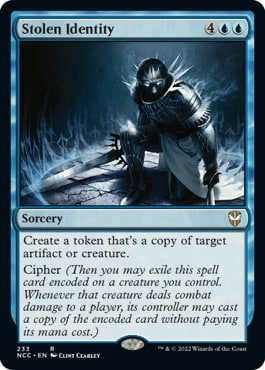Abilities which trigger when a creature deals combat damage have been around since Alpha. Hypnotic Specter, a 2/2 Flying creature for three, could be powered out on turn one with Dark Ritual and start eroding your opponent's hand on turn two.
Abilities like this continue to exist on cards today, known casually as "saboteurs." However, for a hot minute during Gatecrash and Dragon's Maze, Wizards of the Coast created an ability which could turn any creature into a saboteur: Cipher.
There are 15 total cards with Cipher, 13 of which were printed during Gatecrash and Dragon's Maze. Despite being listed as a 9 on the storm scale, making it unlikely to ever see future printings, they managed to squeeze a single card from Outlaws of Thunder Junction: Commander and Streets of New Capenna: Commander out of the ability. Let's talk about it.
Mechanics of Magic Overview: Cipher
Listen all y'all, it's a sabotage!
Cipher appears exclusively on Sorceries. The spell works like normal, but the Cipher ability means two things: a spell ability which functions while the spell with Cipher is on the stack, and a static ability which works while the spell with Cipher is in exile.
That spell ability says "if this spell is represented by a card, you may exile this card encoded on a creature you control" (Rule 702.99a).
The static ability says "for as long as this card is encoded on that creature, that creature has 'whenever this creature deals combat damage to a player, you may copy the encoded card and you may cast the copy without paying its mana cost'" (Rule 702.99a).
If that sounds complicated, it's not, really. It's much more intuitive than it sounds. There are a couple of things worth picking apart, though.
Why do I sabotage everything I love?
Here's how this works. You cast Last Thoughts.
The spell is allowed to resolve. The Cipher ability will resolve after the rest of the spell's effects (one way of thinking about it is the Cipher ability goes on the stack, then the rest of the spell's abilities do too, but you can choose to reorder it).
You draw your card, then you encode Last Thoughts on your Blighted Agent (nasty choice, by the way), placing Last Thoughts in exile. Then you attack with your Blighted Agent, which gets through. When it deals combat damage, Last Thoughts goes on the stack (you get to ignore timing restrictions), will resolve, and you'll draw another card.
Always find another way to ruin things through suffering and sabotage
There are a few more things to know, though.
First, if the spell with Cipher resolves, it goes directly to exile. It never touches the graveyard and won't trigger anything caring about stuff going to the graveyard. It's also worth noting the spell is cast from exile when the creature on which it's encoded deals combat damage.
Second, if the spell with Cipher is countered, both parts are countered.
Third, on the other hand, if the spell is cast from exile because it's encoded, it doesn't remove the encoded card, just counters that one instance of the spell.
Fourth, you may choose not to cast the copy. However, if you don't for any reason, you don't get another shot until the next time the creature deals combat damage. The copy will simply cease to exist the next time state-based actions are performed.
Fifth, Cipher doesn't target, so you can encode your card with Cipher on a creature with Shroud or which otherwise can't be targeted.
Sixth, you can encode a Cipher card on any creature, as long as it's a creature when the Cipher card encodes (immediately after resolving its other effects). So if you want to put it on a Vehicle or a Keyrune or something, go nuts, just make sure it's a creature at the right time. The card with Cipher will remain encoded on the thing even after it stops being a creature.
Now the big ones:
Cipher grants a triggered ability to the creature on which it's encoded. If that creature loses its triggered ability somehow (like Humility being put on the Battlefield), the creature will lose the Cipher card's ability but the card still remains encoded. This is important because if the creature gets its abilities back (Humility gets killed, for example), the creature will regain its triggered ability.
The card with Cipher is encoded on the creature. If you lose control of that creature, the Cipher card will go with it, and the opponent who now controls the creature will get to cast the card with Cipher should they manage to do combat damage with it.
If you copy a creature with an encoded card, the copy will not have the encoded card and will not cast a copy of the spell with Cipher. However, if you manage to divide combat damage among different players simultaneously, you will get copies of the Cipher spell equal to the amount of players you deal damage to. For example, if you have a 3/3 creature with Last Thoughts encoded, and in response to damage you cast Captain's Maneuver where X = 1 and redirect it to another player, you'll deal combat damage to two players and therefore cast Last Thoughts twice!
A Master of Self-Sabotage
The problem with Cipher, according to Mark Rosewater, is the design space is very narrow. Apparently they had a difficult time just coming up with enough cards to fill out the block! As such, it's unlikely we'll see much more of it. That doesn't mean it's not worth running, though. I love Stolen Identity and run it in multiple decks. Whispering Madness is a great Wheel of Fortune effect, if you need that.
Thanks for reading.

























